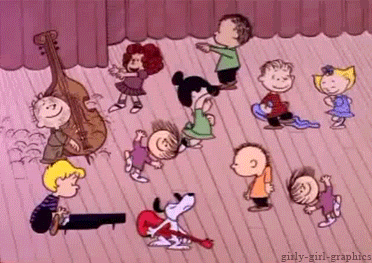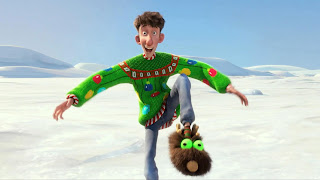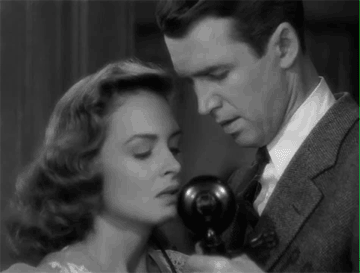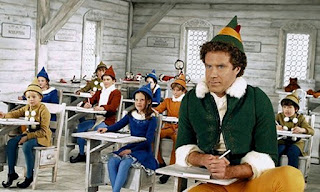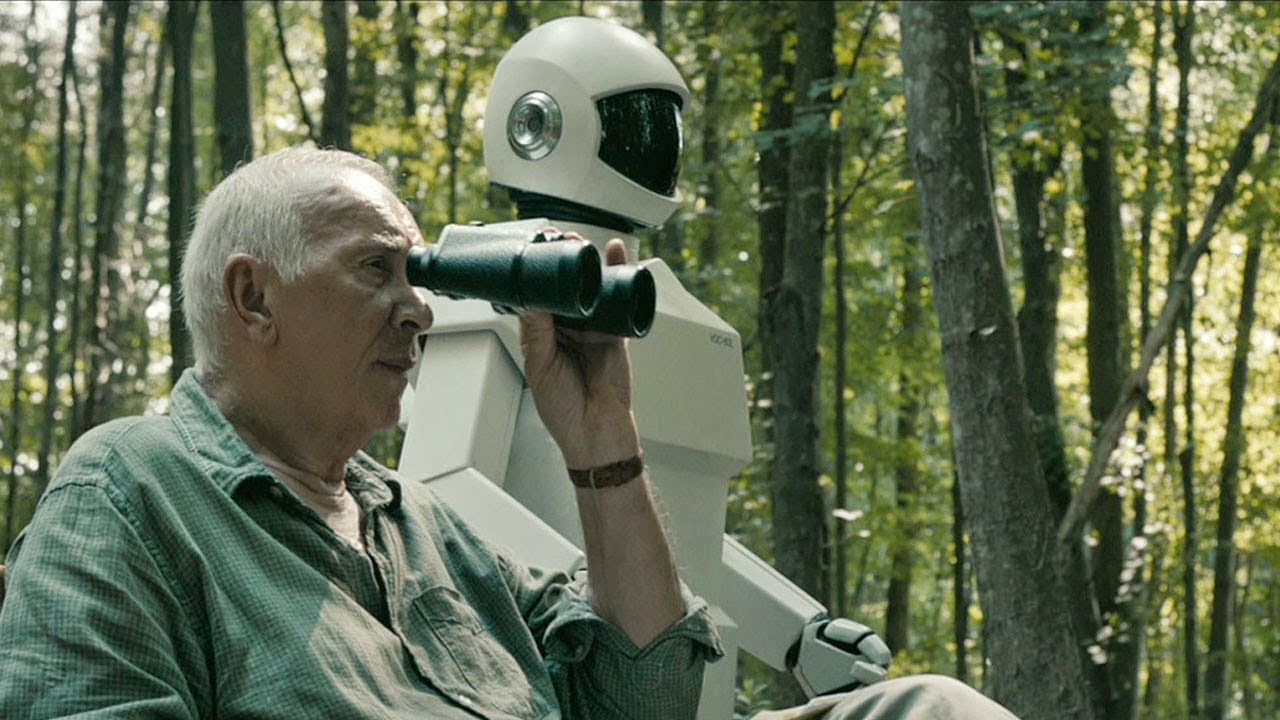
 FILM/TELEVISION
FILM/TELEVISIONDiscovering the Real Meaning of Christmas Movies
I went through that period in my life where I just groused about the undiscerning quality of so many holiday entertainments and I allowed it to put me off the holdiays, but as I lived longer and learned not to be a grouchy jerk ALL the time, I came to apply my understanding of quality in the media arts to Christmas the same way I did with anything else. There may be a mountain of garbage in your way, but there's always something good for the people who inform themselves enough to stray from the path occasionally.
This should, in no way, be interpreted as a "Best of" list. This is simply what I chose to watch this year. Next year, I'll watch some of the same things, and some I won't. Some are old traditions. Some are new. Some aren't going to be traditions at all, or maybe they just need a break. Traditions are only as useful as their meaningfulness in our current lives, and when they lose their meaning, it's time to air them out.
A Charlie Brown Christmas -1965
It's been a few years since I've seen this, but it turned out to be the perfect complement to my holiday mood this year. For weeks, I've had Vince Guaraldi's "Christmas Time is Here" looping through my head, and I drift toward the inevitable on a drowsy blanket of melancholy. I had forgotten how much of that mood I shared with Charlie Brown in this first animated Peanuts special.
After who-knows-how-many times that I've seen it, A Charlie Brown Christmas still had surprises for me. I'm not sure what language to use to describe something that might seem dated by the standards of today's audiences, yet remains wildly progressive because most children's entertainment today is beyond moronic. The Peanuts gang don't talk like children, of course, but I didn't know that when I was a kid, which could explain a few things about how I turned out. When you realize how much we're underselling our kids, you get just the tip of the iceberg of how much we're underselling our society. See what I mean?
A Christmas Horror Story -2015
I was thinking last year that I might add a horror movie to my holiday repertoire. The Finnish "Rare Exports" was interesting, but didn't fit the bill. This just might. The semi-anthologized format really works here, allowing the film to touch on different aspects of both horror and Christmas, while making sure that no one story overstays its welcome. In between acts, we get snippets of William Shatner, which is like buttery-rich icing on the cake. It's not the goriest, but it does get bloody, and bloody good fun.
Trading Places - 1983
Trading Places is one of the all-time great Christmas movies and I will fight the grandmother of anyone who disagrees. It's A Christmas Carol and It's A Wonderful Life and Robin Hood and The Book of Job and Eddie Murphy and Dan Aykroyd at the tops of their game in a fable that still feels timely and true. Top of their games? Tops of their games? I'm saying they were both energetic and fully committed to their comically archetypal roles. It's also packed with terrific character actors and Jamie Lee Curtis in her first big post-slasher role.
The story is timeless, although the film will feel dated to candy-ass millennials -- particularly with regard to political correctness. The events may span from Thanksgiving to New Years, but it's all Christmas.
A Very Harold & Kumar 3D Christmas - 2011
Now me, I love the Harold & Kumar series. When it was announced that they were doing a third one, and that it would be a Christmas movie, I was excited, but very cautiously so. The second H&K, while hilarious, had been a little too much like the first, with a little too little development for the characters. And of course adding Christmas to something is usually desperate and ill-fated. Fortunately, the creators actually made the effort, and the result is a solid series entry that totally holds its own AND pleases its audience. Funny, raunchy, smarter than it acts and sweeter than you'd guess. I have watched this every holiday season since it came out and it's always a high point in the holiday viewing schedule.
Die Hard -1988
I, personally, like Die Hard 3 the best (Sam Jackson, duh), but that's the only (real) Die Hard movie NOT set at Christmas, so at Christmas, we watch Die Hard.
It's not a great Christmas movie per se, but it's great, and it IS a Christmas movie no matter what anyone tries to tell you.
Arthur Christmas -2011
I didn't think I was going to like this movie. As it turns out; I love it.
By portraying a family who has passed down the "Santa Claus" identity across generations, it parallels the growth of commercialism in Christmas, and the way that that has diminished its meaning. In so doing, it serves as a greater cultural metaphor.
But more importantly, it's wild fun and frequently very funny. Arthur, second son and black sheep of the Claus family is an epic screw-up, but of course he has the heart and soul that the family's militarized gift-delivery operation is lacking. His earnest faith in the meaning of Santa forms the gravity around which all the heart, hilarity and hi-jinks orbit. This is animation suitable for adults, especially since many jokes, references and Britishisms will whiz right past the young'uns.
This film runs deep with quality and talent. The cast is no joke with James McAvoy, Jim Broadbent, Bill Nighy and Hugh Laurie as the men of Claus, and several other names and nominees in supporting roles. It would be easy to dismiss it, but that would be like getting yourself a lump of coal for Christmas. Why would you do that? Do you hate yourself? Are you filled with shame?
 Scrooged - 1988
Scrooged - 1988 Scrooged enjoys a fairly good reputation because it is one of the most fun adaptations of Dickens' Christmas Carol. That's not saying a lot because, confidentially, I don't think most people actually enjoy A Christmas Carol as much as you, or they, might think. It's pretty turgid and heavy-handed (Hello, Dickens), the good parts are rarer than you remember, and even if you hadn't seen it a million times, it's just about as predictable as a Swede-penned mechano-pop radio ditty. That being said, the formulaic morality tale has made it fodder for a vast array of adaptations. Come to think of it; is there a more adapted tale? With all the adaptations that there have been (say... Mr. Magoo, The Muppets, Susan Lucci, I assume Urkel did it at some point...), very few of them have been even a little bit good. It's always been a cheap public domain story for sit-coms, cartoons and basic cable to fall back on. Many of them try to be funny and of course few of them truly are. So it's among that peer group that Scrooged shines, but in most other ways, it's somewhat mediocre.
It's not career-retrospective material for Bill Murray. He feels like he's half-assing his way through this one, and not in that good way. Despite its themes of seeking authenticity in Christmas, the whole film feels disingenuous. It's a big, overblown Christmas pageant spectacular, really, with a conference room full of guest actors in bit roles. That makes it fun, but it doesn't really strengthen the viewer's connection to the characters, and the characters are so thin that they really could have used the help.
The film could easily have lost one under-developed subplot and it would have been a benefit. My vote is for the business rival played by John Glover, although I could also let go of the Bob Goldthwait story which felt redundant (splitting the Bob Cratchet character into Alfre Woodard and Goldthwait as recipients of Scrooge/Frank Cross' indifference and cruelty, respectively). It didn't know what to do with Goldthwait until the story needed him again, so following Frank's cruelty to him, the world just continued to knock him down (while meaningful parts of his story take place off screen). It seems gratuitously cruel, and that's far from the only time.
And that's really the biggest problem with Scrooged. No, it's not AS funny as it should be with that cast. But more than that, it's cold. The big emotional breakthrough at the end couches itself in the rejection of crass, commercial Christmas, but it is SO crass, saccharine and ham-fisted that the movie almost feels like a shaggy dog story. On top of the convenience with which all subplots were supposedly redeemed, Murray fakes his way through a finale that either wasn't written or he didn't like. It was as trite and perfunctory as the last three minutes of a Scooby-Doo episode, and as awkward as a PBS pledge break.
I'm not saying there's nothing to like about Scrooged!. But I am writing this down now so I'll remember not to let it haunt my Christmases future.
A Very Murray Christmas - 2015
This is a much better way to spend Christmas with Bill Murray. Not a perfect way, but a better way. Murray's holiday special about a holiday special finds him wracked with self-doubt and feeling hopeless on Christmas Eve. It's a slow start to an old-fashioned variety special, but it manages to wedge in the show's high point, as Murray takes casual-acquaintance Chris Rock captive for the most awkward Christmas duet since Bowie met Crosby.
Once the "show" falls apart and the show moves to the bar, it finally builds up a good head of steam. It's the dressed-down Christmas pageant spectacular befitting the 21st century Murray. In many ways, it felt like an almost-suitable heir to the traditional Christmas Eve episode of Letterman. Paul Shaffer is Murray's sidekick and musical director, whether Murray is on TV, in the bar, or passed out and dreaming of fellow Letterman "TV friend" George Clooney. It played a lot like one of the unrehearsed "bits" that Murray used to do for Dave.
On the one hand, I haven't been able to whole-heartedly endorse A Very Murray Christmas due to its rough spots like the slow first act and some very unpolished performances in places, but now, having re-watched Scrooged! for the last time, on the other hand, that roughness is becoming much more attractive in the light of Scrooged!'s excessive, artificial sheen.
I wasn't sure I would watch it again, but in retrospect, I may not have watched it the right way. It would be better with friends... and some spiky egg nog (let's face it, you'll switch to whiskey after the first nog), gathered around a coffee table playing games, enjoying the glow of the roaring fire and good friends' laughter.
Christmas Eve
It's a Wonderful Life - 1946When a tradition is as rich and meaningful as this one, you don't need to replace it. I know it has a convoluted history of doing poorly in theaters and disappearing until it fell out of copyright, at which point it became ubiquitous Christmas Eve viewing. That just makes me love it more. This was a morality tale about the American heart that needed to be revived and preserved. This is a story that we need to tell ourselves as often as possible; that caring about people is good and that greedy old bastards are bad.
But it's more than that. It's... everything. It's a Wonderful Life incorporates a startlingly broad map of human emotion. That's why we've all had that conversation about noticing something new in it on a third, or thirtieth, viewing. It's hope and heartbreak, guilt and pride, joy and loss, restraint and passion, humor and earnestness. Come on, you KNOW that scene with the phone is sexy as hell.
And there's that inescapable truth about it. Yes, the little guy who cares for others does get the shaft, and we know that's wrong. In fact, that's part of the reason we keep coming back to it. We WANT to be George Bailey. We WANT to be good, to give and care until we're spent... but then we want to know that someone will have our back the way the town finally stood up for George. We want that, but we know that the world doesn't work that way, and we give up. Not like George on the bridge. That's a metaphor for the way we give up in our hearts. We become the townspeople; needy and grabby and too scared to listen. We check in with It's a Wonderful Life once a year to see if we've become a bunch of George Baileys yet... and we find a world that more closely resembles Pottersville.
Maybe if we watch it for another thousand years or two, we might pick up on the town coming together in the spirit of generosity. I mean, surely we'd eventually learn some decency from a two thousand year old Christmas story, right?
The Late Show with David Letterman - Christmas Eve, 2014
I have been watching Letterman's late night shows since the early 80s. Somewhere along the line, I realized that his Christmas Eve show was a tradition for me. As the show had become a tradition for me, it was developing its own traditions. Somewhere along the line, Paul Schaffer was allowed to indulge his most Phil Spector fantasies and bring Darlene Love in to sing Christmas (Baby Please Come Home) and it was amazing and demanded to be repeated every Christmas until the end of time, or at least the show. I think it was pretty early on when Paul first told his story about the Sonny & Cher Christmas Special, and I missed it if I didn't hear it every year. After the move to CBS, the meatball on the Empire State Building on the pizza on the Christmas tree became a tradition, and then Dave & Jay Thomas' Quarterback Challenge made them part of a bigger tradition -- a tradition that includes the Greatest Talk Show Story Ever Told.
That show is gone now, but I made sure to save a copy of last year's episode. I will be watching it every Christmas Eve for years to come. It's a tradition.
Christmas Day
Elf -2003Elf is an explosion of fun like the presents and wrapping paper spilled all over the floor on Christmas morning, and that's why I watch it on Christmas Day. It takes all of the syrupy sweetness that can so often become unbearable, and makes it all work.

